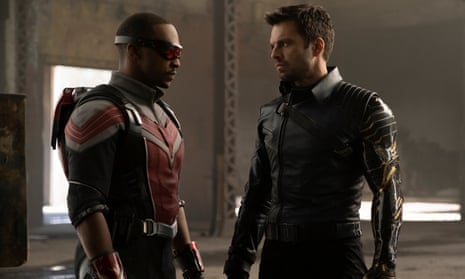Watch any superhero movie and you will see a credit along the lines of “based on the comic book created by”, usually with the name of a beloved and/or long-dead writer or artist. But deep, deep in the credits scroll, you will also see “special thanks” to a long roster of comic book talent, most of them still alive, whose work forms the skeleton and musculature of the movie you just watched. Scenes storyboarded directly from Batman comics by Frank Miller; character arcs out of Thor comics by Walt Simonson; entire franchises, such as the Avengers films or Disney+ spinoff The Falcon and the Winter Soldier, that couldn’t exist without the likes of Kurt Busiek or Ed Brubaker.
The “big two” comic companies – Marvel and DC - may pretend they’ve tapped into some timeless part of the human psyche with characters such as Superman and the Incredible Hulk, but the truth is that their most popular stories have been carefully stewarded through the decades by individual artists and writers. But how much of, say, the Marvel Cinematic Universe’s (MCU) $20bn-plus box office gross went to those who created the stories and characters in it? How are the unknown faces behind their biggest successes being treated?
Not well, according to Brubaker who, with Steve Epting, revived Captain America’s sidekick Bucky Barnes to create the Winter Soldier, portrayed by Sebastian Stan in Marvel’s films and shows. “For the most part, all Steve and I have got for creating the Winter Soldier and his storyline is a ‘thanks’ here or there, and over the years that’s become harder and harder to live with,” Brubaker recently wrote in a newsletter.
“I have a great life as a writer and much of it is because of Cap and the Winter Soldier bringing so many readers to my other work,” he added. “But I also can’t deny feeling a bit sick to my stomach sometimes when my inbox fills up with people wanting comments on the show.” (Marvel told the Guardian it had to “decline to comment out of respect for the privacy of [Brubaker and Epting’s] personal conversations [with the company].”)
Comic creators are “work-for-hire”, so the companies they work for owe them nothing beyond a flat fee and royalty payments. But Marvel and DC also incentivise popular creators to stay on with the promise of steady work and what they call “equity”: a tiny share of the profits, should a character they create or a storyline they write become fodder for films, shows or merch. For some creators, work they did decades ago is providing vital income now as films bring their comics to a bigger audience; they reason – and the companies seem to agree – it’s only fair to pay them more. DC has a boilerplate internal contract, which the Guardian has seen, which guarantees payments to creators when their characters are used. Marvel’s contracts are similar, according to two sources with knowledge of them, but harder to find; some Marvel creators did not know they existed.
A Marvel spokesman said there was no restrictions on when creators could approach the company about contracts, and said that they are having ongoing conversations with writers and artists pertaining to both recent and past work. A DC spokesman did not return multiple requests for comment. But the use of these contracts is at these companies’ discretion and the promised money can fall by the wayside.
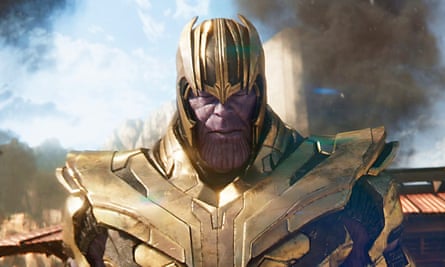
“The squeaky wheel gets the grease,” Jim Starlin, who created Thanos, recently told the Hollywood Reporter; Starlin negotiated a bigger payout after arguing that Marvel had underpaid him for its use of Thanos as the big bad of the MCU. Prolific Marvel writer Roy Thomas got his name added to the credits of Disney+ series Loki after his agent made a fuss. But these are creators that Marvel needs to keep happy; things can go very differently if nobody cares when you complain.
Bestselling author Ta-Nehisi Coates, who wrote a run of Marvel’s Black Panther and followed Brubaker and Epting’s Captain America run with his own a few years later, says that he believes Marvel has moral obligations to its artists and writers that go beyond contracts.
“Long before I was writing Captain America, I read [Brubaker and Epting’s] Death of Captain America storyline, and Return of the Winter Soldier, and it was some of the most thrilling storytelling I’d ever read,” Coates says. “I’d rather read it than watch the movies – I love the movies too – but it doesn’t seem just for them to extract what Steve and Ed put into this and create a multi-billion dollar franchise.”
Coates says he feels fairly treated when it comes to his own work, but he is adamant that lesser known names deserve better treatment from the big studios, no matter what their contracts say: “Just because it’s in a contract doesn’t make it right. If I have some kind of leverage over you, I can get you to sign a contract to fuck you over. It’s just legalist.”
Over the decades, Marvel and DC have become parts of Fortune 500 companies: the Walt Disney Company owns Marvel, and DC is owned by a subsidiary of AT&T. Now, deciding what share of the success their comic creators deserve is a matter of complex wrangling between Marvel and DC, which want to maintain good relations with their talent, and the vast bureaucracies above them.
Among creators, there is a general sense that it has become harder to get paid at Marvel. One source told the Guardian that Marvel subtracted its own legal fees from a protracted negotiation over royalty payments. Others who have worked for DC and Marvel say both count on artists and writers preferring not to spend time chasing them for royalties.
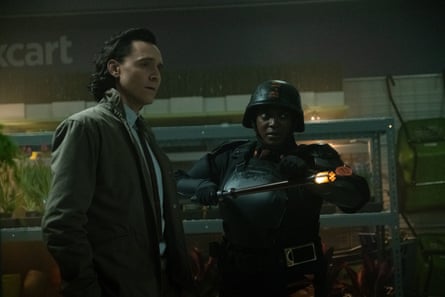
“Lawyer up, always, with comic book company contracts,” says Jimmy Palmiotti, longtime writer of DC characters such as Jonah Hex and Harley Quinn. “They are not in the business of feeding you the math.” Once a year, freelancers are allowed to audit the returns on their creations for DC and Marvel, but Palmiotti says it happens too rarely: “I can count on one hand the number of creators who’ve actually audited a major comics company.”
According to multiple sources, when a writer or artist’s work features prominently in a Marvel film, the company’s practice is to send the creator an invitation to the premiere and a cheque for $5,000 (£3,600). Three different sources confirmed this amount to the Guardian. There’s no obligation to attend the premiere, or to use the $5,000 for travel or accommodation; sources described it as a tacit acknowledgment that compensation was due.
Marvel declined to comment on this, citing privacy concerns. “We can’t speak to our individual agreements or contracts with talent,” said a spokesman.
Several sources who have worked with Marvel say that remuneration for contributing to a franchise that hits it big varies between the $5,000 payment, nothing, or – very rarely – a “special character contract”, which allows a select few creators to claim remuneration when their characters or stories are used. There are other potential ways to earn more – many former writers and artists are made executives and producers on Marvel’s myriad movies, cartoons and streaming series, for example – but those deals depend on factors other than legal obligation.
“I’ve been offered a [special character contract] that was really, really terrible, but it was that or nothing,” says one Marvel creator, who asked not to be named. “And then instead of honouring it, they send a thank you note and are like, ‘Here’s some money we don’t owe you!’ and it’s five grand. And you’re like, ‘The movie made a billion dollars.’”
Both Marvel’s “special character contract”, or DC’s equivalent, a “creator equity” contract, are ways to keep creators happy enough that they don’t hold back all of their original creations for competitors. DC pioneered these contracts back in the 1970s and 1980s, responding in part to Marvel’s treatment of Captain America creator Jack Kirby. Jim Shooter, then Marvel’s editor-in-chief, refused to return original art to Kirby unless he signed a lengthy release form allowing the company to adapt his creations – including the Incredible Hulk, the Fantastic Four, Iron Man, Black Panther and the X-Men – without any compensation. DC saw an opportunity to score PR points, and offered Frank Miller, Alan Moore and Dave Gibbons what appeared to be much better contracts for works such as Ronin and Watchmen. (The company used a technicality to renege within a few years).
Brubaker has recalled once attending Comic-Con, where he watched Roz Kirby yell at Jim Shooter about his mistreatment of her husband in the middle of a panel on creators’ rights. (The panel, incidentally, included Moore and Miller, who were celebrating the apparent fairness of their own contracts at DC.) Decades later, Brubaker helped Marvel find success with his Captain America run with Steve Epting. According to sources, Brubaker and Epting showed up in tuxedos to the premiere party for Captain America: The Winter Soldier, a movie directly based on their comics, only to find that they weren’t on the list. Brubaker texted Sebastian Stan, the actor who played his and Epting’s character, Bucky Barnes, and he let them in.
Some creators told the Guardian that they did not know that Marvel even had the special character contract like DC. In fact, the Guardian has seen an application for the “Marvel Special Character Contract”, in which creators can formally ask Marvel whether one of their characters qualifies for extra payouts. In the application form, Marvel explicitly reserves the right to tell creators their characters aren’t original enough to get the bonus, warning that “the decisions are final” and not subject to appeal. DC uses the same measure; in 2015, the studio was criticised for cancelling payments to writer Gerry Conway for his character Power Girl, which the company retroactively decided was derivative of Supergirl and therefore ineligible for the contract, according to Conway. He no longer receives payments for her, he confirmed to the Guardian. DC did not respond to request for comment.
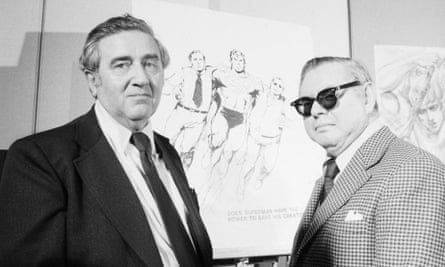
The Power Girl incident highlights how ethically fuzzy these contracts are, since they’re issued by DC and Marvel, drawn up unilaterally by the companies, and paid out when the companies account for their many films, TV shows, video games, trading cards, action figures and sundry other merch. One creator, who asked to remain anonymous, said he and other creators sometimes go to Target to take pictures of action figures of their characters for which payments are due, to demonstrate that their cheques are short.
DC and Marvel came into their own at a time of change in copyright law. The Copyright Act of 1976 gave artists the one-time right to cancel their contracts with IP holders, an option many exercised after witnessing the mistreatment of Superman creators Jerry Siegel and Joe Shuster, who were left penniless. Artist Al Jaffee once claimed his pay cheques from EC Comics were issued with contracts on the back, so he couldn’t cash them without signing over the rights to his work. This was a common practice throughout the industry, including at Marvel, and one that was reevaluated in the wake of the act.
As comics publishers evolved into major media operations, their staff grew concerned about mistreatment of talent. There were famous fights over royalties, and thorny questions over what credit was due to thousands of co-creators working in a shared universe. In 2000, a consortium of publishers founded a charity to directly aid artists who’d fallen on the hardest times, called the Hero Initiative. (Marvel is a founding member, and AT&T lets employees donate directly from their paycheques.) By the 1980s, people who worked in comics at every level were fans, in the same way that even the ushers on Broadway can sing and dance if called upon. In 1986, DC editor Paul Levitz and DC president Jeanette Kahn were working on new schemes to more fairly compensate writers and artists. Moore, Gibbons, and Miller’s contracts were meant to usher in a new era of fairness. It was a long time coming: some were already looking askance at DC after its treatment of Siegel and Shuster came to light during the production of the 1978 film Superman.
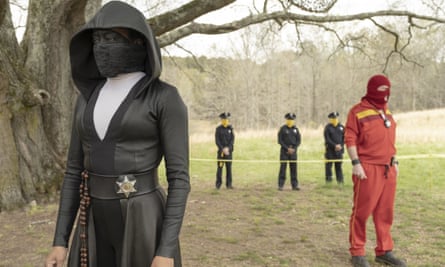
But Moore and Gibbons’s Watchmen was a huge success, going through multiple reprints – unprecedented for a graphic novel – and DC never had to let its right to republish lapse, so it never did. The pair had a right to a share of merchandise profits; DC produced merch, classified it as “promotional items” and told Moore and Gibbons they weren’t owed anything. The vaunted in-house contracts that can make creators’ lives livable can always be subverted.
To the extent that there is any semblance of fairness in the industry now, it’s primarily Levitz’s doing, alongside Kahn and Karen Berger, who is now at Dark Horse Comics. Levitz left DC in 2009, but his influence is still felt across the industry.
“You want to create a situation where you never get to the old Russian joke where they pretend to pay us, and we pretend to work,” Levitz says. “You want people to win when the companies win. I’m proud of the fact that we improved the quality of how we treated creative people.” More than one creator recounts calling Levitz to ask for more money because of a scene in a lucrative Batman movie that lifted plot points or names from their work, then being shocked when they got it.
Many of his peers say that Levitz was a bulwark against meddling by executives at Warner Brothers. For years, he blocked the publication of Watchmen sequels, of which Moore and Gibbons disapproved – something DC did soon after Levitz left, to widespread condemnation. Without another Levitz, the “big two” are once again attracting the criticism that led to the creation of these elusive “special” contracts in the first place. Some creators have left the medium entirely, but others have founded their own studios, such as Image and Dark Horse, providing creators with alternative outlets. As Marvel and DC may find, more creators – Brubaker and Jupiter’s Legacy creator Mark Millar are already among them – will simply not work for them again.
